
Jun 19, 2017 | Focolare Worldwide
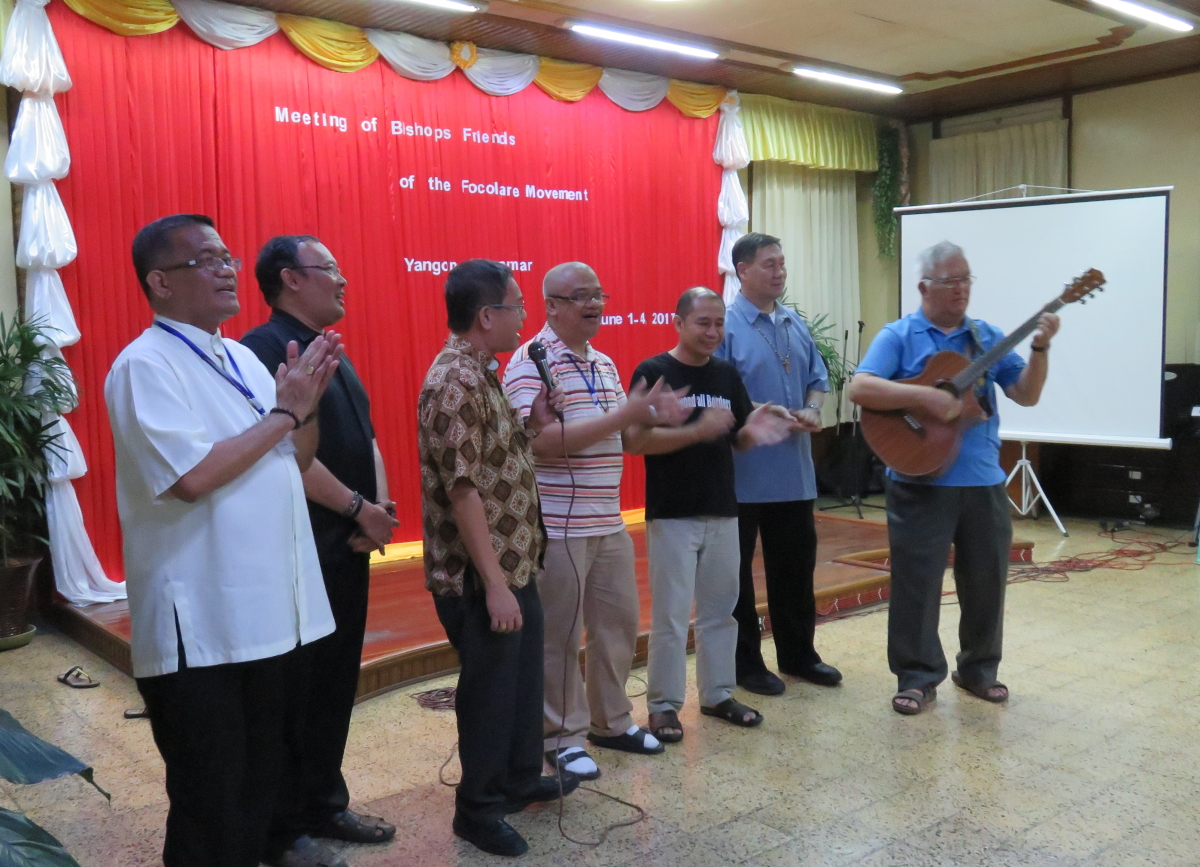 “That all may be one. We were born for these words of unity, to contribute to making it a reality in the world.” The words of Chiara Lubich, commented on by Bishop Felix Liam, President of the Episcopal Conference of Myanmar, on the first day of the meeting (1- 4 June 2017), well evidenced the aim of the convention held this year in Yangon, Myanmar, a country in Southeast Asia, on the western side of Indochina. These conventions held every year at international, ecumenical and regional levels,began about 40 years ago on the initiative of Chiara Lubich and Klaus Hemmerle (1929-1994), then Bishop of Aachingen, (Germany).. In Yangon, with a strong presence of the episcopate of Myanmar (19 bishops), there was a warm family atmosphere. Among the 31 participants,a good number came from the Philippines, India, Malaysia and South Korea. In communicating his experience on his encounter with the spirituality of unity, Cardinal Francis Xavier Kriengsak of Bangkok, moderator of the bishop-friends of the Focolare, invited the bishops to discover and deepen one of the fundamental points of the spirituality of unity: Jesus crucified and abandoned, and place it in the centre of their lives in order to become instruments of communion in the Church and humanity. This was also testified to by the experience of the members of the local community of the Focolare who had prepared to welcome the bishops in the best way possible. But also some bishops, like the Irish Bishop Brendan Leahy, see in the mystery of Jesus forsaken, the “countenance of mercy, key to dialogue and unity, and pathway to the sanctity of the people.” The life of Bishop Klaus Hemmerle was conveyed through a PowerPoint presentation and brief videos that showed the amazing fruitfulness of love for Jesus Forsaken even in the most “critical” situations. The themes on Evangelisation and Inculturation in the spirituality of unity were very actual and trigged particular interest in a country which is mostly Buddhist.
“That all may be one. We were born for these words of unity, to contribute to making it a reality in the world.” The words of Chiara Lubich, commented on by Bishop Felix Liam, President of the Episcopal Conference of Myanmar, on the first day of the meeting (1- 4 June 2017), well evidenced the aim of the convention held this year in Yangon, Myanmar, a country in Southeast Asia, on the western side of Indochina. These conventions held every year at international, ecumenical and regional levels,began about 40 years ago on the initiative of Chiara Lubich and Klaus Hemmerle (1929-1994), then Bishop of Aachingen, (Germany).. In Yangon, with a strong presence of the episcopate of Myanmar (19 bishops), there was a warm family atmosphere. Among the 31 participants,a good number came from the Philippines, India, Malaysia and South Korea. In communicating his experience on his encounter with the spirituality of unity, Cardinal Francis Xavier Kriengsak of Bangkok, moderator of the bishop-friends of the Focolare, invited the bishops to discover and deepen one of the fundamental points of the spirituality of unity: Jesus crucified and abandoned, and place it in the centre of their lives in order to become instruments of communion in the Church and humanity. This was also testified to by the experience of the members of the local community of the Focolare who had prepared to welcome the bishops in the best way possible. But also some bishops, like the Irish Bishop Brendan Leahy, see in the mystery of Jesus forsaken, the “countenance of mercy, key to dialogue and unity, and pathway to the sanctity of the people.” The life of Bishop Klaus Hemmerle was conveyed through a PowerPoint presentation and brief videos that showed the amazing fruitfulness of love for Jesus Forsaken even in the most “critical” situations. The themes on Evangelisation and Inculturation in the spirituality of unity were very actual and trigged particular interest in a country which is mostly Buddhist. 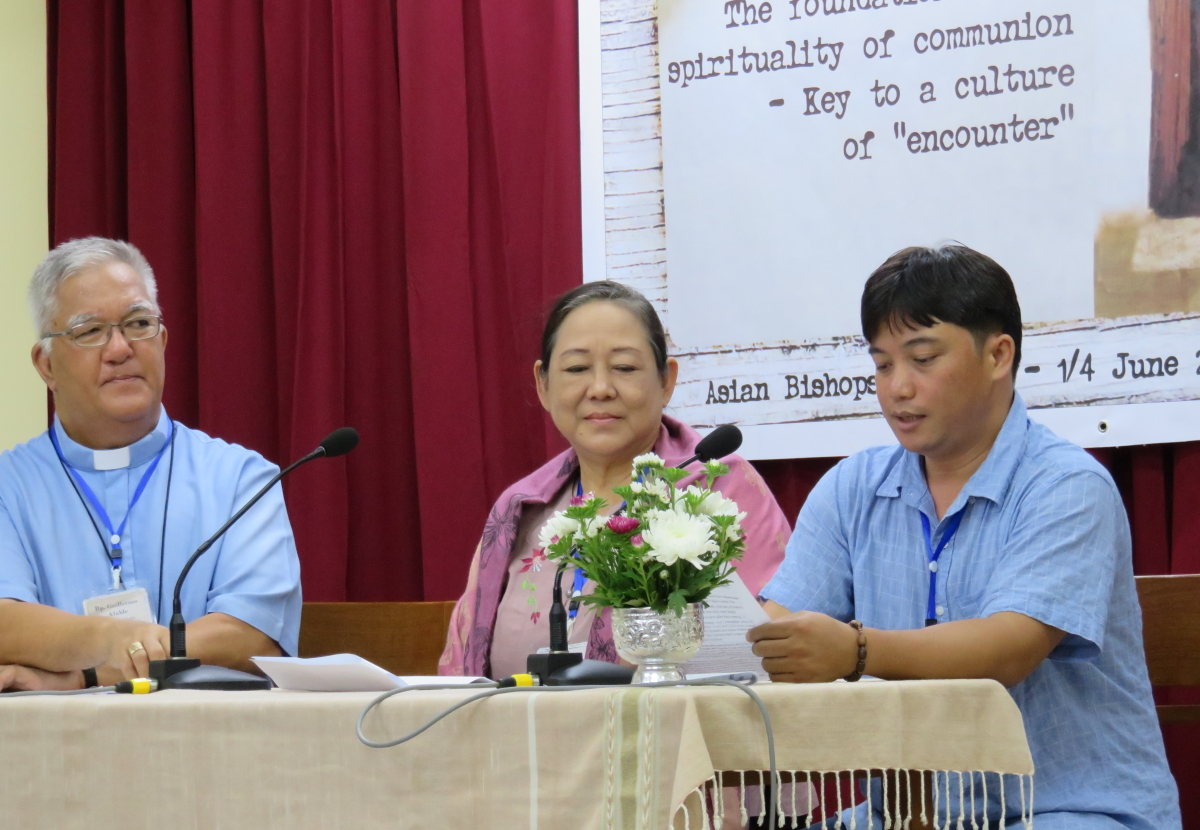 The story of Chiara Lubich and the Movement she had given life to, along with the experiences of the members of the local community, was very moving. Cardinal Carlo Bo, archbishop of Yangon said: “I was very impressed by the story of the charismatic and prophetic life of the founder of the movement. More than ever the Church needs movements like the Focolare. While the arrogance of power divides people according to colour and race, Chiara created a global communion for worldwide peace.” Bishop Matthias (Myanmar) commented: “When one usually participates in the meeting of bishops, we listen to many things, but on an intellectual level. Instead, here we talk about life and we see happy people.»And Bishop Isaac (Myanmar):“The life of a bishop is not easy, and we ourselves often feel abandoned. Now that I have met Jesus Forsaken, I will have the strength and the light to go ahead.” From Korea, Bishop Peter added: «It is the first time for me to participate in a meeting of bishops. Here I saw people who try to love Jesus Forsaken in every difficulty; people who are behind the wings, try to serve all of us,» referring to the members of the local community of the Movement. Openness to cultural and interreligious dialogue was assumed in the golden colours of the Pagoda of Shwedagon, the most important and renowned in the capital, and in which the relics of the four Buddhas are jealously guarded. The visit to this sacred place on the hill of Singuttara, to the west of Royal Lake, was a symbol of respect for the Buddhist soul and the culture of the place. At the top of the Pagoda, a banner-like anemoscope scattered with precious stones, displays the direction of the wind. If sufficiently supported, its fluttering is accompanied by the sound of tiny bells. The Myanmar bishops are certain of which direction the wind is blowing: in the direction of unity, towards a Church which is increasingly a witness of “communion”.
The story of Chiara Lubich and the Movement she had given life to, along with the experiences of the members of the local community, was very moving. Cardinal Carlo Bo, archbishop of Yangon said: “I was very impressed by the story of the charismatic and prophetic life of the founder of the movement. More than ever the Church needs movements like the Focolare. While the arrogance of power divides people according to colour and race, Chiara created a global communion for worldwide peace.” Bishop Matthias (Myanmar) commented: “When one usually participates in the meeting of bishops, we listen to many things, but on an intellectual level. Instead, here we talk about life and we see happy people.»And Bishop Isaac (Myanmar):“The life of a bishop is not easy, and we ourselves often feel abandoned. Now that I have met Jesus Forsaken, I will have the strength and the light to go ahead.” From Korea, Bishop Peter added: «It is the first time for me to participate in a meeting of bishops. Here I saw people who try to love Jesus Forsaken in every difficulty; people who are behind the wings, try to serve all of us,» referring to the members of the local community of the Movement. Openness to cultural and interreligious dialogue was assumed in the golden colours of the Pagoda of Shwedagon, the most important and renowned in the capital, and in which the relics of the four Buddhas are jealously guarded. The visit to this sacred place on the hill of Singuttara, to the west of Royal Lake, was a symbol of respect for the Buddhist soul and the culture of the place. At the top of the Pagoda, a banner-like anemoscope scattered with precious stones, displays the direction of the wind. If sufficiently supported, its fluttering is accompanied by the sound of tiny bells. The Myanmar bishops are certain of which direction the wind is blowing: in the direction of unity, towards a Church which is increasingly a witness of “communion”.
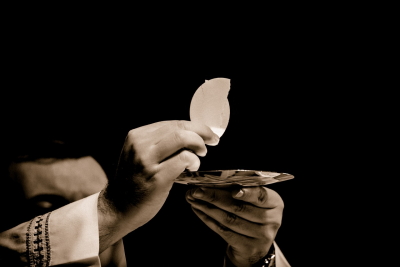
Jun 18, 2017 | Non categorizzato
 “A piece of bread, transformed by Jesus to satisfy the hunger of every heart: this is Jesus’s story reduced to the bare bones. It’s ours: the little path for his love, love strong in weakness.” (From an article, May 1980) “Every time we celebrate the Eucharist, what takes place is not only a pleasant communion with others in the spirit of Jesus as a mere idea or feeling. No, every time we celebrate the Eucharist the most radical wall of existence is brought down, the wall of death; what happens to us is pure gift, gift that is truly conferred to us. It’s proximity, proximity within which the mutual distances – both interior and exterior – are obliterated. In the Eucharist, not only do we become one body with each other, but we become His body for the world. For anybody who is truly permeated by the Eucharist this world and this society can no longer remain indifferent. They now have this dynamic in them, dynamics of God who offers himself, who gives himself, who carries with humanity as something of his very own and intimate to him, all that humanity carries, all that it does.” (Conference, August 31, 1977) “What’s important is not only that we have the Eucharist here in our community. We retain the spirit of Jesus only if and when we concretely love the other’s community as our own, if and when our communities open beyond the barriers that separate them and if in the midst of the communities lives the Lord.” (From an article, May 1979) Source: La luce dentro le cose, Klaus Hemmerle (Rome: Città Nuova, 1998), 190, 186, 187, 192.
“A piece of bread, transformed by Jesus to satisfy the hunger of every heart: this is Jesus’s story reduced to the bare bones. It’s ours: the little path for his love, love strong in weakness.” (From an article, May 1980) “Every time we celebrate the Eucharist, what takes place is not only a pleasant communion with others in the spirit of Jesus as a mere idea or feeling. No, every time we celebrate the Eucharist the most radical wall of existence is brought down, the wall of death; what happens to us is pure gift, gift that is truly conferred to us. It’s proximity, proximity within which the mutual distances – both interior and exterior – are obliterated. In the Eucharist, not only do we become one body with each other, but we become His body for the world. For anybody who is truly permeated by the Eucharist this world and this society can no longer remain indifferent. They now have this dynamic in them, dynamics of God who offers himself, who gives himself, who carries with humanity as something of his very own and intimate to him, all that humanity carries, all that it does.” (Conference, August 31, 1977) “What’s important is not only that we have the Eucharist here in our community. We retain the spirit of Jesus only if and when we concretely love the other’s community as our own, if and when our communities open beyond the barriers that separate them and if in the midst of the communities lives the Lord.” (From an article, May 1979) Source: La luce dentro le cose, Klaus Hemmerle (Rome: Città Nuova, 1998), 190, 186, 187, 192.

Jun 17, 2017 | Focolare Worldwide
 My path began on the last day of the Rwandan calendar, the day in which we remember the massacre that happened in 1994. I know that Jesus Forsaken can give meaning to every human suffering, especially the ones that leave the deepest wounds in our hearts. I sense a profound bond between the sacrifice of Jesus and the pain and suffering of the Rwandan people. Under the guidance of Father Telesphore, a local priest, he became acquainted with the capital city of Kigali known for its attractiveness. The signs of economic growth, however, can especially be seen in the centre of the city which looks like a European capital. But not far from the modern buildings there are the common folk, bound to agriculture and selling their products at market: fruit, vegetables, chickens, and so forth. Due to my white skin and tall stature, my presence doesn’t go by unnoticed. I encounter many surprised faces, but it’s enough to offer a greeting of “muraho” or a smile and the ice melts into a nice smile. We visit the main cities of the country by car, stopping now and then to give someone a ride. I was particularly struck by one young woman around 20 years old. Behind her pretty smile was a painful story. Fr Telesphore tells me that her parents were killed in the 1990 genocide. She had just been to their tomb where she went to pray. She and her young brother have been visiting Father Telesphore since they were young. They found a family that filled them with love. I met many other people in situations that were similar to theirs. We spent Saturday at the seminary school of theology which takes in 130 seminarians from around the country. At the Mass, which was imbued with Rwandan culture, I was very touched by the Thanksgiving After Communion with songs that engaged the whole assembly. It was like a sacred rythm, not perfectly synchronized, but incredibly harmonic. At one seminary we held a “school” for seminarians who wanted to know about the spirituality of unity. Right from the start, Father Telesphore clarified for everyone that “this school is not run with books, but with life” and that “we’re here to build the unity Jesus desired, through our reciprocal love.” The Gospel love among everytone could be felt in very strong and concrete ways throughout the meeting. After a basketball match, I found myself asking who had won? The answer: everybody. Where there’s love, competition becomes an occasion to live the Gospel. We focused on the mystery of Jesus Forsaken, which is one of the points of the spirituality of unity. We were all moved by the testimony of two priests, one from Rwanda and the other from Burundi, lands that are marked by mutual misunderstandings. But through love towards Jesus in his abandonment, those misunderstandings gave way to unity between the two priests. One of the seminarians spoke for everyone: “When you speak with the heart, you touch us in the heart.” The last days were dedicated to meeting with families and young people, but also other people who share the ideal of fraternity. We concluded with a pilgrimage to the Shrine of Our Lady, which was not far from the seminary. We wanted to thank her for this trip and for the immeasureable gifts we all recevied. (Armando A. – Brazil)
My path began on the last day of the Rwandan calendar, the day in which we remember the massacre that happened in 1994. I know that Jesus Forsaken can give meaning to every human suffering, especially the ones that leave the deepest wounds in our hearts. I sense a profound bond between the sacrifice of Jesus and the pain and suffering of the Rwandan people. Under the guidance of Father Telesphore, a local priest, he became acquainted with the capital city of Kigali known for its attractiveness. The signs of economic growth, however, can especially be seen in the centre of the city which looks like a European capital. But not far from the modern buildings there are the common folk, bound to agriculture and selling their products at market: fruit, vegetables, chickens, and so forth. Due to my white skin and tall stature, my presence doesn’t go by unnoticed. I encounter many surprised faces, but it’s enough to offer a greeting of “muraho” or a smile and the ice melts into a nice smile. We visit the main cities of the country by car, stopping now and then to give someone a ride. I was particularly struck by one young woman around 20 years old. Behind her pretty smile was a painful story. Fr Telesphore tells me that her parents were killed in the 1990 genocide. She had just been to their tomb where she went to pray. She and her young brother have been visiting Father Telesphore since they were young. They found a family that filled them with love. I met many other people in situations that were similar to theirs. We spent Saturday at the seminary school of theology which takes in 130 seminarians from around the country. At the Mass, which was imbued with Rwandan culture, I was very touched by the Thanksgiving After Communion with songs that engaged the whole assembly. It was like a sacred rythm, not perfectly synchronized, but incredibly harmonic. At one seminary we held a “school” for seminarians who wanted to know about the spirituality of unity. Right from the start, Father Telesphore clarified for everyone that “this school is not run with books, but with life” and that “we’re here to build the unity Jesus desired, through our reciprocal love.” The Gospel love among everytone could be felt in very strong and concrete ways throughout the meeting. After a basketball match, I found myself asking who had won? The answer: everybody. Where there’s love, competition becomes an occasion to live the Gospel. We focused on the mystery of Jesus Forsaken, which is one of the points of the spirituality of unity. We were all moved by the testimony of two priests, one from Rwanda and the other from Burundi, lands that are marked by mutual misunderstandings. But through love towards Jesus in his abandonment, those misunderstandings gave way to unity between the two priests. One of the seminarians spoke for everyone: “When you speak with the heart, you touch us in the heart.” The last days were dedicated to meeting with families and young people, but also other people who share the ideal of fraternity. We concluded with a pilgrimage to the Shrine of Our Lady, which was not far from the seminary. We wanted to thank her for this trip and for the immeasureable gifts we all recevied. (Armando A. – Brazil)
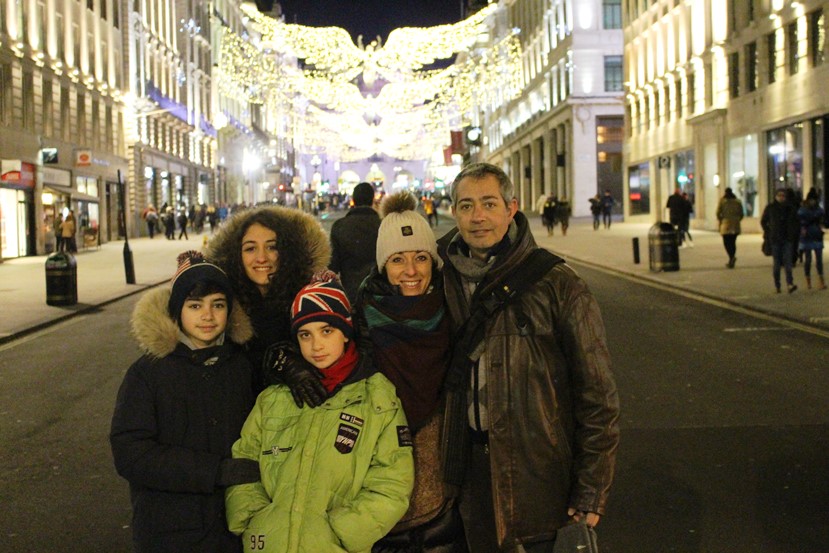
Jun 16, 2017 | Senza categoria
 When we started seeing each other, Hani and I were very much aware of the differences that existed between us, especially with regards to doctrine. But we felt that our love was stronger than any difference; this gave us the courage to believe that there was a special plan of God for our marriage that went beyond us. Through the spirituality of the Focolare Movement, which we had both got to know in our youth, we learnt that in order to reach unity we had to aim at what unites us – which is considerable – rather than looking at what divides us. Of course, when we go our separate ways for Sunday Service, it’s always a suffering, as when unintentionally we might refer to “us” and “you” in our discussions, or when our human reasoning wants to criticise the Church of the other. When this happens, we realise that unity isn’t built once and for all, but that each day God asks us to choose to love the church of the other as our own. Furthermore, we have learnt that each time we experience disunity, it’s an opportunity for us to offer this pain to God for the complete unity among Christians. There are times, however, in order to live unity more fully among us and in our family, when we might attend either one Church or the other all together, and to take part in some of the spiritual practices, such as fasting for example. An important moment for us was the baptism of our first child. We discussed the issue at length, but we could not decide which was the right thing: whether to have a Catholic or Orthodox baptism. While the Sacrament was the same for both Churches, the consequences would have been profoundly different. Hani, in fact, is a deacon and he was temporarily removed from his Church because of his mixed marriage. A Catholic baptism for our child would have put him in a difficult situation. We found it hard to make a decision, but then I realized that I should consult my bishop about it. I went to him and told him the whole situation. I felt welcomed by him and listened to in depth. The bishop was grateful that I had sought his advice and he assured me that he would understand and support any decision that Hani and I took, following our conscience. At that point, it was clear to me that, for the sake of Hani and his Church, it was best to have an Orthodox baptism. On this occasion, as in many others, it was not a question of making compromises, but to discern God’s will in that circumstance. Naturally this entails making an extra effort, which sometimes costs blood, sweat and tears, also with the children who, when still little, could not understand why they could receive Communion in the Orthodox Church, but not in the Catholic Church. In fact, in the Orthodox Church, the sacraments of communion and confirmation are administered simultaneously during baptism. We went through a rather difficult time last year with our eldest daughter, who was then 15 years old. She started demanding to be more independent and was being aggressive about it. We were unprepared for this sudden change. There were daily quarrels, often quite heated. We wanted to protect her from situations which we considered precarious, but the more we checked up on her, the more she rebelled. I spent so many nights crying for this daughter I felt I no longer knew. It was not easy between us either, because I thought the way Hani handled the situation was not optimum and so we argued a lot. But in all this confusion, we always tried to be faithful to some practices that seemed important to us, such as praying all together, or having the humility to ask pardon when necessary, even with the youngest ones. At a certain point, we realised how important it was to maintain unity between us. We decided to show complete trust in her. The situation improved significantly at home, which confirms that even in a mixed marriage it’s possible for the married couple to “be one in God” and to give this witness to the children and the world around us.
When we started seeing each other, Hani and I were very much aware of the differences that existed between us, especially with regards to doctrine. But we felt that our love was stronger than any difference; this gave us the courage to believe that there was a special plan of God for our marriage that went beyond us. Through the spirituality of the Focolare Movement, which we had both got to know in our youth, we learnt that in order to reach unity we had to aim at what unites us – which is considerable – rather than looking at what divides us. Of course, when we go our separate ways for Sunday Service, it’s always a suffering, as when unintentionally we might refer to “us” and “you” in our discussions, or when our human reasoning wants to criticise the Church of the other. When this happens, we realise that unity isn’t built once and for all, but that each day God asks us to choose to love the church of the other as our own. Furthermore, we have learnt that each time we experience disunity, it’s an opportunity for us to offer this pain to God for the complete unity among Christians. There are times, however, in order to live unity more fully among us and in our family, when we might attend either one Church or the other all together, and to take part in some of the spiritual practices, such as fasting for example. An important moment for us was the baptism of our first child. We discussed the issue at length, but we could not decide which was the right thing: whether to have a Catholic or Orthodox baptism. While the Sacrament was the same for both Churches, the consequences would have been profoundly different. Hani, in fact, is a deacon and he was temporarily removed from his Church because of his mixed marriage. A Catholic baptism for our child would have put him in a difficult situation. We found it hard to make a decision, but then I realized that I should consult my bishop about it. I went to him and told him the whole situation. I felt welcomed by him and listened to in depth. The bishop was grateful that I had sought his advice and he assured me that he would understand and support any decision that Hani and I took, following our conscience. At that point, it was clear to me that, for the sake of Hani and his Church, it was best to have an Orthodox baptism. On this occasion, as in many others, it was not a question of making compromises, but to discern God’s will in that circumstance. Naturally this entails making an extra effort, which sometimes costs blood, sweat and tears, also with the children who, when still little, could not understand why they could receive Communion in the Orthodox Church, but not in the Catholic Church. In fact, in the Orthodox Church, the sacraments of communion and confirmation are administered simultaneously during baptism. We went through a rather difficult time last year with our eldest daughter, who was then 15 years old. She started demanding to be more independent and was being aggressive about it. We were unprepared for this sudden change. There were daily quarrels, often quite heated. We wanted to protect her from situations which we considered precarious, but the more we checked up on her, the more she rebelled. I spent so many nights crying for this daughter I felt I no longer knew. It was not easy between us either, because I thought the way Hani handled the situation was not optimum and so we argued a lot. But in all this confusion, we always tried to be faithful to some practices that seemed important to us, such as praying all together, or having the humility to ask pardon when necessary, even with the youngest ones. At a certain point, we realised how important it was to maintain unity between us. We decided to show complete trust in her. The situation improved significantly at home, which confirms that even in a mixed marriage it’s possible for the married couple to “be one in God” and to give this witness to the children and the world around us.
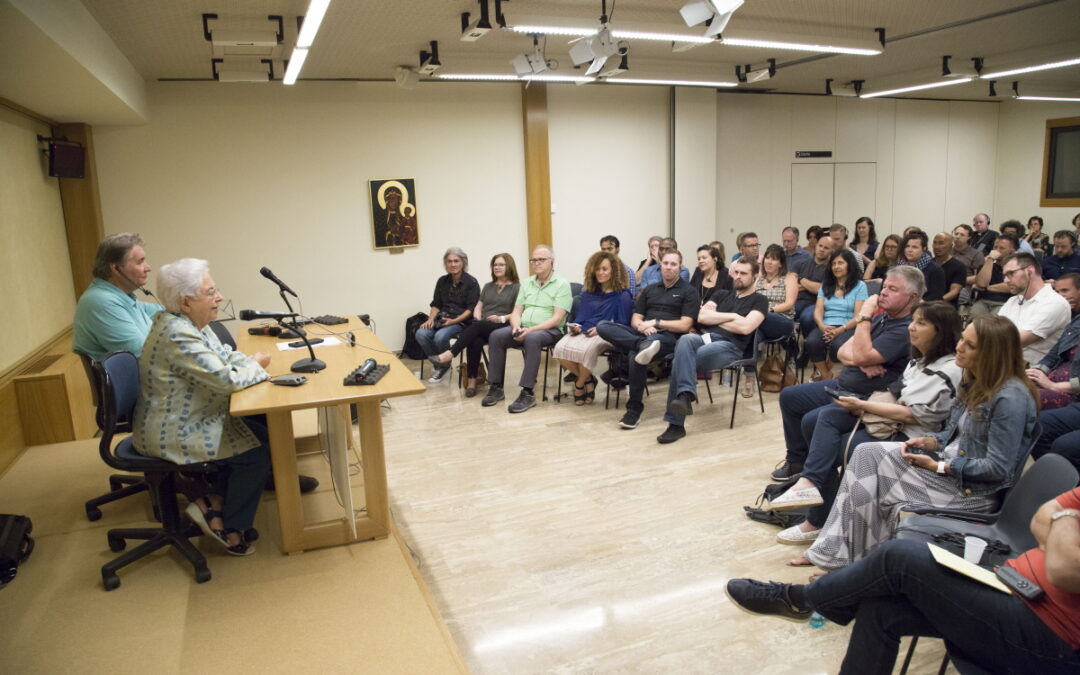
Jun 15, 2017 | Non categorizzato
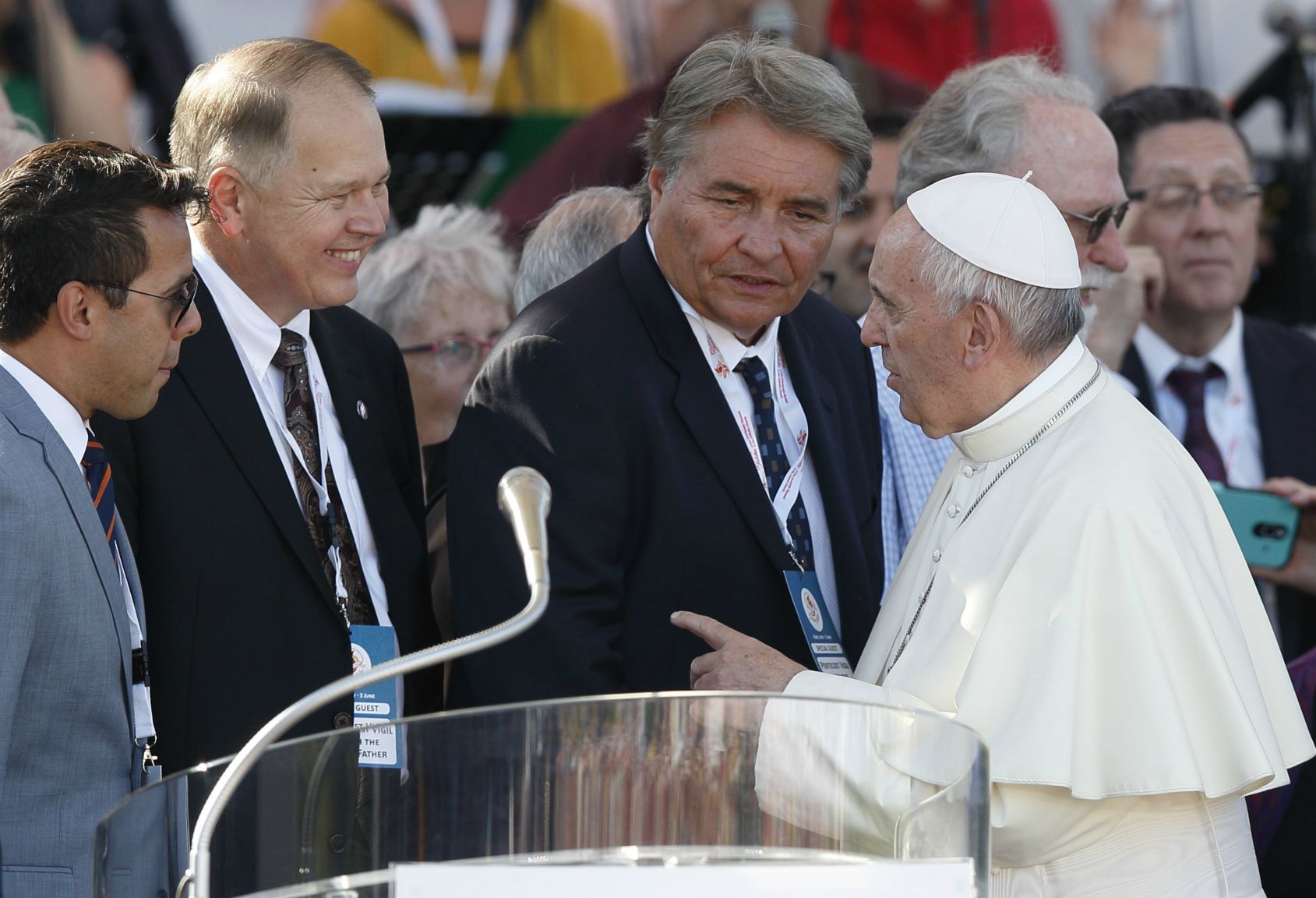
At the Vigil of Pentecost at the Circus Maximus in Rome
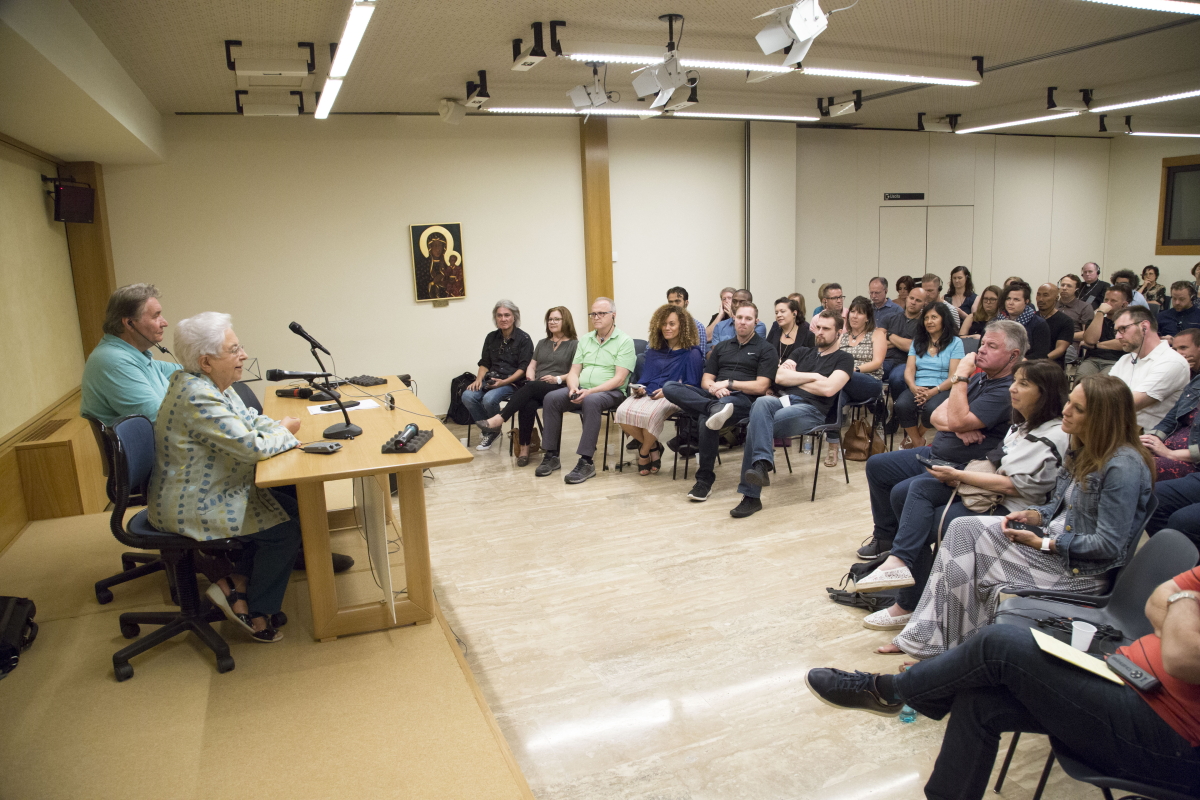
Photo credit: © CSC Audiovisivi-Caris Mendes
Jun 14, 2017 | Non categorizzato
The website is up in preparation for the 2018 Synod of Bishops on “Youth, Faith and Vocational Discernment”. The site contains a questionnaire in five languages, to facilitate the widest participation of all the young people in the world, not only to receive information of the event, but also to interact and take part in the preparation.” “Let your shout be heard, let it resound in the communities and make it reach the pastors,” Pope Francis exhorted the young people. He went on: “Saint Benedict reccommended that abbots to consult the youngest members before any important decision because, “it is often to the youngest that the Lord reveals the best solutions.”
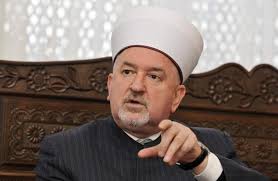
Jun 14, 2017 | Non categorizzato
 “A recipe for success doesn’t exist, but there is a recipe for failure. The recipe for failure is violence ‘in the name of Allah’”. With these words, the Grand Mufti Emeritus of Bosnia Herzogovina turned to the Muslims of Europe with an appeal. He made it on the day after the bloody attacks in London and Manchester. Like Chiara Lubich before him, and presently Maria Voce, Mustafa Ceric was once the honorary president of Religions for Peace. “This is not my faith. This is not the Allah I believe in. My faith is never the knife, it’s never terror. My Allah is Loving and Merciful. […] “I confess that I have never felt so confused and so helpless in trying to explain what is happening inside and outside my community of faith. I console myself with the thought that these are the actions of extreme minorities, just a political game by great powers to gain Muslim wealth.” The Grand Mufti had been awarded the Felix Houphouet-Boigny UNESCO Peace Prize in 2003 and the Sternberg Prize of the International Council of Christians and Jews “for his outstanding contribution to the understanding of the faith.” In 2007 he received the Theodor-Heuss-Stiftung Prize for his Contribution to the Dissemination and Strengthening of Democracy and in 2008 the Eugen Biser Foundation Prize for his efforts to promote understanding and peace between Christian and Islamic thought. Mustafa Ceric used strong words: “My faith community has many problems. The biggest one is that of delegating to others the solutions of our problems. Instead, my Community of Faith, my Ummah, must solve its problems within itself before solving the problems around it.” There are those who claim that the attacks against innocent civilians in Manchester or London are more important than the ones in Palestine, in Kabul, Mosul, Sa’an and Misurata, said Ceric. “They aren’t more important, but certainly more dangerous for the Muslims in Europe, the majority of whom have escaped from Muslim countries to seek peace and safety for their children in Europe. The peace and safety they have experienced up until now are threatened. After Manchester, London – and even before that, Berlin and Zurich – “the European Muslims have to be strong and clear not only about condemning violence ‘in the name of Allah’, but also about taking concrete measures against any form of abuse of Islam. They need to have a clear voice, a united and irrevocable voice in the struggle against the violence that is supported ‘in the name of Allah’. It is no longer a matter of individual goodwill of individuals or groups that work for interreligious dialogue. It is an existential problem for Islam and for the Muslims in Europe.” The Grand Mufti therefore launched an appeal to the Muslims of Europe to “gather together immediately around a “common word” between us and our neighbours independent of their faith, race or nationality, to swear an oath to God, to themselves and to their own neighbours in Europe: an oath to love and promote peace, security and cooperation in accordance with what we are obliged to do by our culture and Islamic faith. We must swear that we will do everything that is necessary to fight together against violence towards innocent people. We present-day generations of European Muslims owe it to our descendants who have no blame.” “This is no longer the time to hesitate!” The Mufti vehemently expressed his hope and desire for a change. “There’s no room for calculation! There are no longer excuses for putting it off, nor justifications for waiting! There is no salvation in silence! There is no future for Islam nor for Muslims in Europe if not in coexistence and in tolerance with our European neighbours!”
“A recipe for success doesn’t exist, but there is a recipe for failure. The recipe for failure is violence ‘in the name of Allah’”. With these words, the Grand Mufti Emeritus of Bosnia Herzogovina turned to the Muslims of Europe with an appeal. He made it on the day after the bloody attacks in London and Manchester. Like Chiara Lubich before him, and presently Maria Voce, Mustafa Ceric was once the honorary president of Religions for Peace. “This is not my faith. This is not the Allah I believe in. My faith is never the knife, it’s never terror. My Allah is Loving and Merciful. […] “I confess that I have never felt so confused and so helpless in trying to explain what is happening inside and outside my community of faith. I console myself with the thought that these are the actions of extreme minorities, just a political game by great powers to gain Muslim wealth.” The Grand Mufti had been awarded the Felix Houphouet-Boigny UNESCO Peace Prize in 2003 and the Sternberg Prize of the International Council of Christians and Jews “for his outstanding contribution to the understanding of the faith.” In 2007 he received the Theodor-Heuss-Stiftung Prize for his Contribution to the Dissemination and Strengthening of Democracy and in 2008 the Eugen Biser Foundation Prize for his efforts to promote understanding and peace between Christian and Islamic thought. Mustafa Ceric used strong words: “My faith community has many problems. The biggest one is that of delegating to others the solutions of our problems. Instead, my Community of Faith, my Ummah, must solve its problems within itself before solving the problems around it.” There are those who claim that the attacks against innocent civilians in Manchester or London are more important than the ones in Palestine, in Kabul, Mosul, Sa’an and Misurata, said Ceric. “They aren’t more important, but certainly more dangerous for the Muslims in Europe, the majority of whom have escaped from Muslim countries to seek peace and safety for their children in Europe. The peace and safety they have experienced up until now are threatened. After Manchester, London – and even before that, Berlin and Zurich – “the European Muslims have to be strong and clear not only about condemning violence ‘in the name of Allah’, but also about taking concrete measures against any form of abuse of Islam. They need to have a clear voice, a united and irrevocable voice in the struggle against the violence that is supported ‘in the name of Allah’. It is no longer a matter of individual goodwill of individuals or groups that work for interreligious dialogue. It is an existential problem for Islam and for the Muslims in Europe.” The Grand Mufti therefore launched an appeal to the Muslims of Europe to “gather together immediately around a “common word” between us and our neighbours independent of their faith, race or nationality, to swear an oath to God, to themselves and to their own neighbours in Europe: an oath to love and promote peace, security and cooperation in accordance with what we are obliged to do by our culture and Islamic faith. We must swear that we will do everything that is necessary to fight together against violence towards innocent people. We present-day generations of European Muslims owe it to our descendants who have no blame.” “This is no longer the time to hesitate!” The Mufti vehemently expressed his hope and desire for a change. “There’s no room for calculation! There are no longer excuses for putting it off, nor justifications for waiting! There is no salvation in silence! There is no future for Islam nor for Muslims in Europe if not in coexistence and in tolerance with our European neighbours!”

Jun 14, 2017 | Non categorizzato
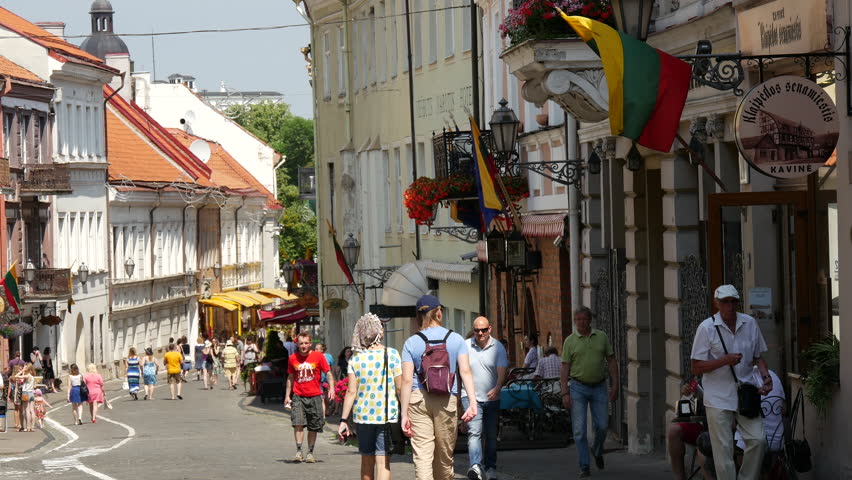
Škofja Loka
 “About a year ago,” Natalija continues, “we were put to the test. In summer, the smallest of our children underwent some counselling, which is done routinely when infants reach the age of three. The psychologist’s diagnosis really surprised us: Attention Deficit Disorder. As an ex-teacher and pedagogue expert, I saw before my eyes all those children who had this type of problem and the difficulties parents had to face in dealing with it. Shocked and dazed, I went back to Ray of Sunshine kindergarten, where Damijan and I both worked. We talked things over for a long time and we realized that for our son to have the best care, one of us had to give up their job.” “We knew we had to devote all our time and energy,” says Damijan. “We were conscious of the fact that we still had a mortgage, that we were six in the family and that we were low-income earners. We explored all the financial possibilities and, despite the uncertainty, I left my job believing that God would not abandon us. We shared our situation, and consequent decision, with our work colleagues. We were grateful to each one for their understanding and support. In the following week, our choice proved to be the right one. On night, my mother, who lived with us, had a stroke and remained paralyzed. It was a shock for us all. For the first two months she was able to feed herself, but there was a subsequent stroke that led to blindness and then dementia. She therefore needed more and more care. Although challenging, we respected her desire to remain at home. In the meantime, our son’s condition improved considerably. In fact things were much calmer all round. When the children arrived home from school, there was always someone waiting for them with a meal on the table. And when Natalija arrived home from work, she was able to devote herself totally to the family. Throughout this time, though living on only one salary, we can say that we lack nothing. And even if we have to give up something, it’s not a deprivation. We are grateful to God for having supported us and for having taught us to live the art of loving, and also to reap the fruits which have won us over completely.”
“About a year ago,” Natalija continues, “we were put to the test. In summer, the smallest of our children underwent some counselling, which is done routinely when infants reach the age of three. The psychologist’s diagnosis really surprised us: Attention Deficit Disorder. As an ex-teacher and pedagogue expert, I saw before my eyes all those children who had this type of problem and the difficulties parents had to face in dealing with it. Shocked and dazed, I went back to Ray of Sunshine kindergarten, where Damijan and I both worked. We talked things over for a long time and we realized that for our son to have the best care, one of us had to give up their job.” “We knew we had to devote all our time and energy,” says Damijan. “We were conscious of the fact that we still had a mortgage, that we were six in the family and that we were low-income earners. We explored all the financial possibilities and, despite the uncertainty, I left my job believing that God would not abandon us. We shared our situation, and consequent decision, with our work colleagues. We were grateful to each one for their understanding and support. In the following week, our choice proved to be the right one. On night, my mother, who lived with us, had a stroke and remained paralyzed. It was a shock for us all. For the first two months she was able to feed herself, but there was a subsequent stroke that led to blindness and then dementia. She therefore needed more and more care. Although challenging, we respected her desire to remain at home. In the meantime, our son’s condition improved considerably. In fact things were much calmer all round. When the children arrived home from school, there was always someone waiting for them with a meal on the table. And when Natalija arrived home from work, she was able to devote herself totally to the family. Throughout this time, though living on only one salary, we can say that we lack nothing. And even if we have to give up something, it’s not a deprivation. We are grateful to God for having supported us and for having taught us to live the art of loving, and also to reap the fruits which have won us over completely.”
Jun 14, 2017 | Non categorizzato
For your commitment to peace, promoting a series of initiatives to convert a weapons factory in the province of Iglesias” (Sardinia, Italy). The missive, dated June 3 addressed the local community of the Focolare Movement, (New Humanities section), for all the endeavours undertaken with Amnesty International, Oxfam, Fondazione Banca Etica, Opal Brescia and Italian Disarmament Network, for the “RVM reconversion” (Multinational Arms-producing Company). The Holy Father said he was “happy to know that you are concretely involved in promoting a dignified employment, as an alternative to the manufacture of arms, in a territory that is still undergoing serious employment crises.” Lastly, he expressed his “solidarity for the commitment in spreading the culture of peace.”
![The dialogue wanted by God]()
Jun 13, 2017 | Non categorizzato
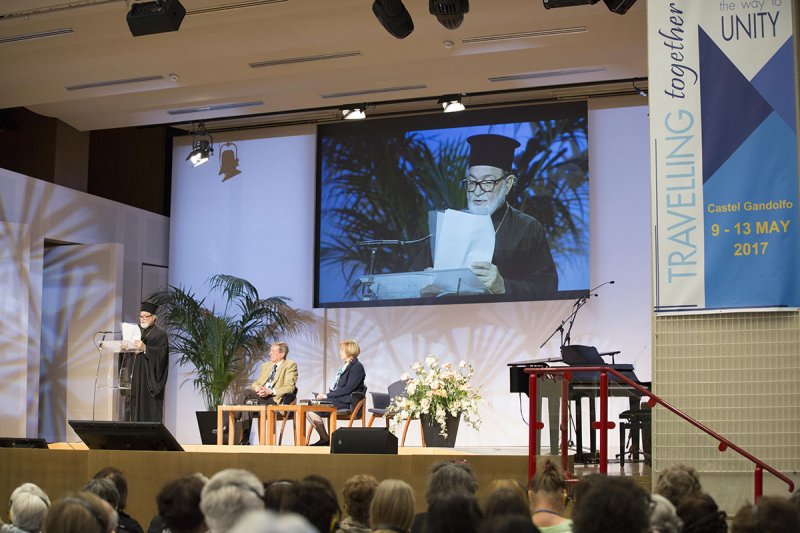 Patriarch Athenagoras and Chiara Lubich, protagonists of unity. Beginning again is never and never has been easy, especially if deep trenches have been dug over time, if certain differences have become cultural, if – to complicate matters – there is even the certainty of being in the right. It wouldn’t be far from the truth to say that this was the situation in the mid-1900s between the Catholic and the Orthodox Church, after centuries, an entire millennium, the separation was nurtured and cultivated. Then…the historic turning point. The celebrated and unforgettable and glorious memories of the initiators of the ‘dialogue of Love’, the great inventors of the dialogue of the people: Athenagoras, Ecumenical Patriarch, and Chiara Lubich, foundress of the Movement of unity. With their humble, serious and willingness, with dedication, love and prayer they were the initiators of a new ecumenical Era; they instructed the peoples, giving them courage, strength, patience, faithfulness, willingness, love and unity. Deep down the solution was simple, and the Patriarch expressed it with the following words: “We lived alone, without brothers, without having sisters for many centuries, like orphans. Why? The brother and sister are the door. There lies the secret!” The unforgettable protagonists of the ‘dialogue of love’, the great inventors of the dialogue of the people met a good 27 times, between 1967 and 1972 when the Patriarch died. There first encounter goes back to June 13th, 1967 when Lubich visited the Ecumenical Patriarchate of Constantinople, even though, until this day, that moment has never been adequately appreciated for its full value. The Patriarch approved and lovingly embraced the seriousness of the charism of Chiara, her mystical spirituality that is a spirituality of the Church, to the point that their encounter was even considered ‘an ecstasy’, and the conviction grew more and more in him that by living the words of Jesus’s Testament could lead us to the same chalice. With these touching words he remarked: ‘For me it would be a day of Paradise.’
Patriarch Athenagoras and Chiara Lubich, protagonists of unity. Beginning again is never and never has been easy, especially if deep trenches have been dug over time, if certain differences have become cultural, if – to complicate matters – there is even the certainty of being in the right. It wouldn’t be far from the truth to say that this was the situation in the mid-1900s between the Catholic and the Orthodox Church, after centuries, an entire millennium, the separation was nurtured and cultivated. Then…the historic turning point. The celebrated and unforgettable and glorious memories of the initiators of the ‘dialogue of Love’, the great inventors of the dialogue of the people: Athenagoras, Ecumenical Patriarch, and Chiara Lubich, foundress of the Movement of unity. With their humble, serious and willingness, with dedication, love and prayer they were the initiators of a new ecumenical Era; they instructed the peoples, giving them courage, strength, patience, faithfulness, willingness, love and unity. Deep down the solution was simple, and the Patriarch expressed it with the following words: “We lived alone, without brothers, without having sisters for many centuries, like orphans. Why? The brother and sister are the door. There lies the secret!” The unforgettable protagonists of the ‘dialogue of love’, the great inventors of the dialogue of the people met a good 27 times, between 1967 and 1972 when the Patriarch died. There first encounter goes back to June 13th, 1967 when Lubich visited the Ecumenical Patriarchate of Constantinople, even though, until this day, that moment has never been adequately appreciated for its full value. The Patriarch approved and lovingly embraced the seriousness of the charism of Chiara, her mystical spirituality that is a spirituality of the Church, to the point that their encounter was even considered ‘an ecstasy’, and the conviction grew more and more in him that by living the words of Jesus’s Testament could lead us to the same chalice. With these touching words he remarked: ‘For me it would be a day of Paradise.’  Not much time was needed before the Patriarch declared himself to be a “focolarino” and began to call Lubich by the name of “Tecla,” having discerned in her the same zeal as the isapostolo [equal to the Apostles]. He went on to say: ‘We are thirsty for this spirituality.’ Meanwhile, Chiara was equally touched and to her the Patriarch ‘appeared as an Archangel that struggles and fights to the end for his ideal: a man of God, proven in heroic love and heroic patience’. With her spirituality and marvellous personality, Chiara not only prepared the two principle and most important Bridges: Paul VI and Athenagoras, but she also managed to unite those two Bridges. Through encounters between Orthodox and Catholics, the bond of mutual love mitigated the sorrow of not being able to share the Eucharist; indeed, it made this cross loveable as a contribution of the Christian People to that One Chalice. “The Pope is our leader,” the Patriarch confided to Chiara. “…sometimes I see the Pope ‘in agony,’ because he knows everything that there is of negative in the world. This is why I placed myself one hundred percent at his service. I follow him, I understand him, I love him, I respect him, I admire him.” As a follow-up of this fifty-year journey, I personally proposed to Msgr Piero Coda, president of Sophia University Institute (SUI), the institution of an Ecumenical Chair in recognition of these two extraordinary protagonists of brotherhood among the Orthodox and Catholic Church. My proposal received magnanimous and cordial approval, along with the blessing of Patriarch Bartholomew and the enthusiastic support of Focolare president, Maria Voce. Let us offer from our hearts one great ‘thank you’ like beautiful flowers to Athenagoras and to Chiara who were sent by God, who gave their life above all else to the realization of God’s will: ‘Tthat all be one’, for it will given as a gift of the Holy Spirit.
Not much time was needed before the Patriarch declared himself to be a “focolarino” and began to call Lubich by the name of “Tecla,” having discerned in her the same zeal as the isapostolo [equal to the Apostles]. He went on to say: ‘We are thirsty for this spirituality.’ Meanwhile, Chiara was equally touched and to her the Patriarch ‘appeared as an Archangel that struggles and fights to the end for his ideal: a man of God, proven in heroic love and heroic patience’. With her spirituality and marvellous personality, Chiara not only prepared the two principle and most important Bridges: Paul VI and Athenagoras, but she also managed to unite those two Bridges. Through encounters between Orthodox and Catholics, the bond of mutual love mitigated the sorrow of not being able to share the Eucharist; indeed, it made this cross loveable as a contribution of the Christian People to that One Chalice. “The Pope is our leader,” the Patriarch confided to Chiara. “…sometimes I see the Pope ‘in agony,’ because he knows everything that there is of negative in the world. This is why I placed myself one hundred percent at his service. I follow him, I understand him, I love him, I respect him, I admire him.” As a follow-up of this fifty-year journey, I personally proposed to Msgr Piero Coda, president of Sophia University Institute (SUI), the institution of an Ecumenical Chair in recognition of these two extraordinary protagonists of brotherhood among the Orthodox and Catholic Church. My proposal received magnanimous and cordial approval, along with the blessing of Patriarch Bartholomew and the enthusiastic support of Focolare president, Maria Voce. Let us offer from our hearts one great ‘thank you’ like beautiful flowers to Athenagoras and to Chiara who were sent by God, who gave their life above all else to the realization of God’s will: ‘Tthat all be one’, for it will given as a gift of the Holy Spirit.
Metropolitan Gennadios Zervos,
Archbishop of Italy and Malta of the Ecumenical Patriarchate of Constantinople

 “That all may be one. We were born for these words of unity, to contribute to making it a reality in the world.” The words of Chiara Lubich, commented on by Bishop Felix Liam, President of the Episcopal Conference of Myanmar, on the first day of the meeting (1- 4 June 2017), well evidenced the aim of the convention held this year in Yangon, Myanmar, a country in Southeast Asia, on the western side of Indochina. These conventions held every year at international, ecumenical and regional levels,began about 40 years ago on the initiative of Chiara Lubich and Klaus Hemmerle (1929-1994), then Bishop of Aachingen, (Germany).. In Yangon, with a strong presence of the episcopate of Myanmar (19 bishops), there was a warm family atmosphere. Among the 31 participants,a good number came from the Philippines, India, Malaysia and South Korea. In communicating his experience on his encounter with the spirituality of unity, Cardinal Francis Xavier Kriengsak of Bangkok, moderator of the bishop-friends of the Focolare, invited the bishops to discover and deepen one of the fundamental points of the spirituality of unity: Jesus crucified and abandoned, and place it in the centre of their lives in order to become instruments of communion in the Church and humanity. This was also testified to by the experience of the members of the local community of the Focolare who had prepared to welcome the bishops in the best way possible. But also some bishops, like the Irish Bishop Brendan Leahy, see in the mystery of Jesus forsaken, the “countenance of mercy, key to dialogue and unity, and pathway to the sanctity of the people.” The life of Bishop Klaus Hemmerle was conveyed through a PowerPoint presentation and brief videos that showed the amazing fruitfulness of love for Jesus Forsaken even in the most “critical” situations. The themes on Evangelisation and Inculturation in the spirituality of unity were very actual and trigged particular interest in a country which is mostly Buddhist.
“That all may be one. We were born for these words of unity, to contribute to making it a reality in the world.” The words of Chiara Lubich, commented on by Bishop Felix Liam, President of the Episcopal Conference of Myanmar, on the first day of the meeting (1- 4 June 2017), well evidenced the aim of the convention held this year in Yangon, Myanmar, a country in Southeast Asia, on the western side of Indochina. These conventions held every year at international, ecumenical and regional levels,began about 40 years ago on the initiative of Chiara Lubich and Klaus Hemmerle (1929-1994), then Bishop of Aachingen, (Germany).. In Yangon, with a strong presence of the episcopate of Myanmar (19 bishops), there was a warm family atmosphere. Among the 31 participants,a good number came from the Philippines, India, Malaysia and South Korea. In communicating his experience on his encounter with the spirituality of unity, Cardinal Francis Xavier Kriengsak of Bangkok, moderator of the bishop-friends of the Focolare, invited the bishops to discover and deepen one of the fundamental points of the spirituality of unity: Jesus crucified and abandoned, and place it in the centre of their lives in order to become instruments of communion in the Church and humanity. This was also testified to by the experience of the members of the local community of the Focolare who had prepared to welcome the bishops in the best way possible. But also some bishops, like the Irish Bishop Brendan Leahy, see in the mystery of Jesus forsaken, the “countenance of mercy, key to dialogue and unity, and pathway to the sanctity of the people.” The life of Bishop Klaus Hemmerle was conveyed through a PowerPoint presentation and brief videos that showed the amazing fruitfulness of love for Jesus Forsaken even in the most “critical” situations. The themes on Evangelisation and Inculturation in the spirituality of unity were very actual and trigged particular interest in a country which is mostly Buddhist.  The story of Chiara Lubich and the Movement she had given life to, along with the experiences of the members of the local community, was very moving. Cardinal Carlo Bo, archbishop of Yangon said: “I was very impressed by the story of the charismatic and prophetic life of the founder of the movement. More than ever the Church needs movements like the Focolare. While the arrogance of power divides people according to colour and race, Chiara created a global communion for worldwide peace.” Bishop Matthias (Myanmar) commented: “When one usually participates in the meeting of bishops, we listen to many things, but on an intellectual level. Instead, here we talk about life and we see happy people.»And Bishop Isaac (Myanmar):“The life of a bishop is not easy, and we ourselves often feel abandoned. Now that I have met Jesus Forsaken, I will have the strength and the light to go ahead.” From Korea, Bishop Peter added: «It is the first time for me to participate in a meeting of bishops. Here I saw people who try to love Jesus Forsaken in every difficulty; people who are behind the wings, try to serve all of us,» referring to the members of the local community of the Movement. Openness to cultural and interreligious dialogue was assumed in the golden colours of the Pagoda of Shwedagon, the most important and renowned in the capital, and in which the relics of the four Buddhas are jealously guarded. The visit to this sacred place on the hill of Singuttara, to the west of Royal Lake, was a symbol of respect for the Buddhist soul and the culture of the place. At the top of the Pagoda, a banner-like anemoscope scattered with precious stones, displays the direction of the wind. If sufficiently supported, its fluttering is accompanied by the sound of tiny bells. The Myanmar bishops are certain of which direction the wind is blowing: in the direction of unity, towards a Church which is increasingly a witness of “communion”.
The story of Chiara Lubich and the Movement she had given life to, along with the experiences of the members of the local community, was very moving. Cardinal Carlo Bo, archbishop of Yangon said: “I was very impressed by the story of the charismatic and prophetic life of the founder of the movement. More than ever the Church needs movements like the Focolare. While the arrogance of power divides people according to colour and race, Chiara created a global communion for worldwide peace.” Bishop Matthias (Myanmar) commented: “When one usually participates in the meeting of bishops, we listen to many things, but on an intellectual level. Instead, here we talk about life and we see happy people.»And Bishop Isaac (Myanmar):“The life of a bishop is not easy, and we ourselves often feel abandoned. Now that I have met Jesus Forsaken, I will have the strength and the light to go ahead.” From Korea, Bishop Peter added: «It is the first time for me to participate in a meeting of bishops. Here I saw people who try to love Jesus Forsaken in every difficulty; people who are behind the wings, try to serve all of us,» referring to the members of the local community of the Movement. Openness to cultural and interreligious dialogue was assumed in the golden colours of the Pagoda of Shwedagon, the most important and renowned in the capital, and in which the relics of the four Buddhas are jealously guarded. The visit to this sacred place on the hill of Singuttara, to the west of Royal Lake, was a symbol of respect for the Buddhist soul and the culture of the place. At the top of the Pagoda, a banner-like anemoscope scattered with precious stones, displays the direction of the wind. If sufficiently supported, its fluttering is accompanied by the sound of tiny bells. The Myanmar bishops are certain of which direction the wind is blowing: in the direction of unity, towards a Church which is increasingly a witness of “communion”.


 My path began on the last day of the Rwandan calendar, the day in which we remember the massacre that happened in 1994. I know that
My path began on the last day of the Rwandan calendar, the day in which we remember the massacre that happened in 1994. I know that 







